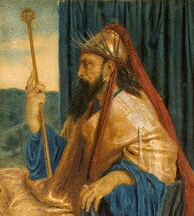 The
Preacher
The
Preacher 
Commentaries on Solomon's book of Ecclesiastes
by Swami Anand Nisarg
- The words of the Preacher, the son of David, king in Jerusalem.

King Solomon
The book of Ecclesiastes is a unique text in the Hebrew Bible. It is unique because it presents a teaching that is totally unlike any of the other books. It is so different, in fact, that it contradicts the beliefs of the Jewish, and Christian, traditions as found in other books of the Bible. So Ecclesiastes was special, and must have been written by someone very special. In the first verse, instead of a name, he is introduced by a title. He is called 'The Preacher'. But we are also told that he was the son of David, and king. Thus we know it was Solomon who is said to have written Ecclesiastes. Is it possible that he did? Or is that just a myth? Indeed, was Solomon himself a myth? I tell you that it must have been Solomon who wrote this book. For the simple reason that this is a very spiritually dangerous book. It contains real teachings that are not found anywhere else in the old testament. If a normal man or prophet had written this kind of book, it would never have been included in the scriptures. In fact, the people and the priests would have had the author killed. Clearly, the one who wrote this book had such power that he could not be eliminated, and had so much prestige that he could not be censored. Solomon was such a man, a great teacher.
- Vanity of vanities, saith the Preacher, vanity of vanities; all is vanity.
Vanity of vanities, what does Solomon mean by this? The real word is very difficult. On the one hand, vain means hopeless, fruitless. Something that will not succeed is vanity. But vanity also means pride. It means thinking oneself more than one is. So when Solomon says "all is vanity" he is saying both that all things are beyond hope, that all things come to naught, and also that everything we do is the product of our own false ideas about ourself or our importance in the world. A misunderstanding of our role.
- What profit hath a man of all his labor which he taketh under the sun?
What does a man gain from all his efforts? Why is life filled with struggle, and is anything gained of it in the end? Solomon is presenting the question that has troubled those who are led to the mystic path since the beginning of time.
- One generation passeth away, and another generation cometh: but the earth abideth for ever.
- The sun also ariseth, and the sun goeth down, and hasteth to his place where he arose.
- The wind goeth toward the south, and turneth about unto the north; it whirleth about continually, and the wind returneth again according to his circuits."
 Solomon
draws your attention to the greater scope of the world. Many people have
come to me with problems. Often, these problems stem from the fact that
people do not recognize themselves as part of a vaster process. It is
easy to think your work is great, your goals are important, and your failures
tragic, if you think you are the center of the universe. Gaining a proper
perspective of your relative insignificance means that you can shift your
focus to the more significant things. People run around chasing all these
silly things, in time they all come to nothing. Meanwhile the sun also
rises and sets, the moon follows on her path, the wind flies in its circuits.
As it did before your life and goals and problems, and as it will afterward.
Solomon
draws your attention to the greater scope of the world. Many people have
come to me with problems. Often, these problems stem from the fact that
people do not recognize themselves as part of a vaster process. It is
easy to think your work is great, your goals are important, and your failures
tragic, if you think you are the center of the universe. Gaining a proper
perspective of your relative insignificance means that you can shift your
focus to the more significant things. People run around chasing all these
silly things, in time they all come to nothing. Meanwhile the sun also
rises and sets, the moon follows on her path, the wind flies in its circuits.
As it did before your life and goals and problems, and as it will afterward.
- All the rivers run into the sea; yet the sea is not full: unto the place from whence the rivers come, thither they return again.
- All things are full of labor; man cannot utter it: the eye is not satisfied with seeing, nor the ear filled with hearing.
Notice that, much like the ocean is never filled by the river, and the river never is emptied in its flowing, the senses of a man are never satisfied. There is never and end to your desires. Solomon is pointing out that this is the cause of struggle, of labour, that you are never emptied of desires. So long as you want more than what is before you, you will have to continue to labour in your life.
- The thing that hath been, it is that which shall be; and that which is done is that which shall be done: and there is no new thing under the sun.
- Is there any thing whereof it may be said, See, this is new? it hath been already of old time, which was before us.
- There is no remembrance of former things; neither shall there be any remembrance of things that are to come with those that shall come after.
'There is nothing new under the sun'. We seek out novelty, we want more, but really we are only reliving the old. It has all been done before, and we repeat it. We do not remember the misery we had before, and will forget this misery afterwards. Likewise, we forget all those 'important' people who had the same lives and problems in the past, and we will be forgotten in time. It all continues, in a pattern.
- I the Preacher was king over Israel in Jerusalem.
- And I gave my heart to seek and search out by wisdom concerning all things that are done under heaven: this sore travail hath God given to the sons of man to be exercised therewith."
 It
is said of Solomon that he practiced all the techniques that had been
known by the ancient masters. In doing this, he became close to God, and
God told him that he could have any one thing he wished. Solomon wished
for a discerning heart, for wisdom. God was pleased that he asked for
this, rather than long life, wealth, or the death of his enemies. And
as a reward God made Solomon the wisest of all men who ever were or would
be. Here, in Ecclesiastes, Solomon says that he has used this wisdom to
seek out an answer to man's suffering.
It
is said of Solomon that he practiced all the techniques that had been
known by the ancient masters. In doing this, he became close to God, and
God told him that he could have any one thing he wished. Solomon wished
for a discerning heart, for wisdom. God was pleased that he asked for
this, rather than long life, wealth, or the death of his enemies. And
as a reward God made Solomon the wisest of all men who ever were or would
be. Here, in Ecclesiastes, Solomon says that he has used this wisdom to
seek out an answer to man's suffering.
- I have seen all the works that are done under the sun; and, behold, all is vanity and vexation of spirit.
- That which is crooked cannot be made straight: and that which is wanting cannot be numbered."
It was in this wisdom that Solomon became aware that all is suffering. And this suffering comes from man's desire. What is desire? Fundamentally, it is an attempt to put your conditions on life. To try to make the world work the way you think it should, rather than the way that is natural for it and for you. When Solomon says that there is nothing crooked that can be made straight, People always want to make things become the way they think is perfect; straighten what is meant to be crooked, or bend what is meant to be straight. And Solomon is saying that in the end, nothing can be altered from its natural course. Things are to be the way they are meant to be. Of course, one can change things, but only when that change falls in the realms of the natural, not when the change is unnatural. Anything you can do, comes not from your will but from the divine.
- I communed with mine own heart, saying, Lo, I am come to great estate, and have gotten more wisdom than all they that have been before me in Jerusalem: yea, my heart had great experience of wisdom and knowledge.
- And I gave my heart to know wisdom, and to know madness and folly: I perceived that this also is vexation of spirit.
- For in much wisdom is much grief: and he that increaseth knowledge increaseth sorrow.
In the final verses of this chapter, Solomon reveals that even the search for wisdom is vanity. We seek out wisdom as just another effort to 'fix' the world to what we would wish it to be. People will first be motivated to seek wisdom not for its own sake, but for a cause. They will seek to understand folly, to know what doesn't work and what does. To try to find a way to solve the madness of the world. But Solomon warns that even the pursuit of wisdom leads to vexation, frustration. That much wisdom only leads to much grief, and much knowledge only leads to much sorrow. This is because like any other goal, when you seek wisdom or knowledge from your desires, you will never have enough. And the more you know in effort to solve your problems, the more questions will arise. You will never have a satisfied mind. You will only become more aware, rather than ignorant, of the hopelessness of your situation.
Copyright © 2003 by Swami Anand
Nisarg. All rights reserved.
This copyright protects Swami Anand Nisarg's right to publication of this
work.
Nonprofit, activist, and educational groups may circulate this work
(forward it, reprint it, translate it, post it, or reproduce it) for nonprofit
uses.
Please do not change any part of it without permission.